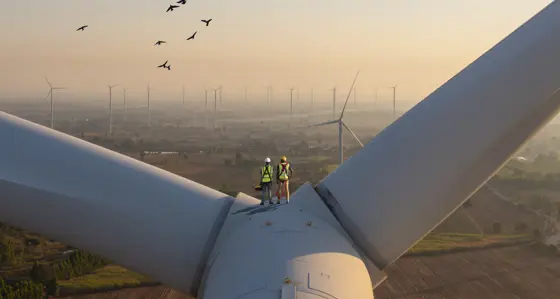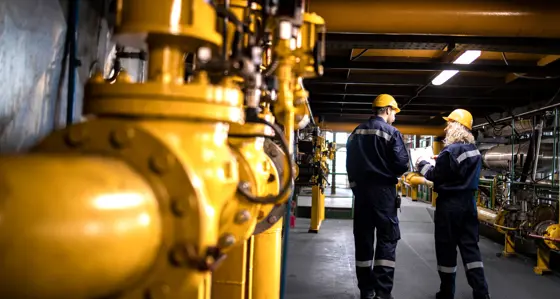
Achieving net zero: How far we've come
28 October 2021
Spending Review 2021 comes at a pivotal moment, poised between the recovery from COVID-19, and the once in a generation challenge of achieving net zero by 2050. Much of the spending review related to net zero was outlined in the Net Zero Strategy last week but will the combination of strategy and pledged funding be enough to deliver the UK on the journey to 2050?
The latest spending review and Autumn budget has landed days before the start of COP26. This key international event will bring together world leaders, and focus minds on the global political challenges of progressing towards net zero and minimising global temperature rises to 1.5°C. Hosting this in the UK brings the actions of the UK government under deeper scrutiny both domestically and across the globe.
Against the backdrop of a world reeling from the effects of the COVID-19 pandemic, great resilience and foresight is needed to make the tough choices now that will deliver the change we all desperately need. Simply put, the research being done today will feed the delivery programmes that give us the mass technology uptake to enable us to meet our 2050 aims. But that long lifecycle won’t come easily or without failures along the way.
In the last year, the UK government has set out increasing numbers of net zero related strategies (The Prime Minister’s Ten Point Plan, Transport Decarbonisation Plan, Heat and Buildings Strategy, Net Zero Strategy etc.). These documents set out ambitions, give some sense of the minded to positions, and how the UK government sees this monumental task being attacked. They also aim to outline how the UK can be an international leader in research, innovation and industry. This goes some way to back up the ambitions set out in the Integrated Review 2021 from March which highlighted action on climate change as a key component of UK national security and international policy.
The Spending Review 2021 outlines some of the funding available across the various departments and puts ‘building back greener’ as a key focus area of the post-pandemic recovery and highlights £26 billion of public capital investment made across the last year.
Putting these strategies down on paper and finding funding in the latest spending review is brilliant progress. Undoubtedly ambitions could be higher and more money could have been found, however this represents positive movement that must be built upon, not taken for granted. Unfortunately having some funding and a written strategy doesn’t get us to net zero. The next few months and years will be hard graft and uncomfortable decisions will need to be made. To achieve these outcomes, the UK government will need to mindful of three key factors:
-
Delivery mindset and skill
To shift from strategy to delivery requires a different set of skills within government and a clear understanding of both consumer and industry needs. While prior programmes may have been beset by delivery challenges, current and future programmes must do better and actually achieve the outcomes they set out to. Doing this requires government to build its own delivery capabilities and invest in a civil service that is capable of stewarding industry to deliver rather than hoping that change will magically happen.
To support those delivery teams, the right governance needs to be in place, there must be consistency in how the portfolio of programmes is set up, with progress continually being measured against plans to keep all players honest and stand up to public scrutiny. A portfolio approach will enable players across the economy to come together and break down silos, encouraging stronger engagement with a mind-set of agility and flexibility to test and learn on the go.
-
Driving investment
A key thrust of the messaging from government ministers in recent weeks has been about “unleashing capitalism” and driving private investment to support net zero and the energy transition. Undoubtedly, private investment is crucial to turning research into mass market solutions and providing the capital needed to enable our economy to have a low carbon future.
This won’t be a case of opening a door and seeing money flood in. Attracting finance will need to be considered across the detail of each delivery programme, making sure policies support unlocking green investment.
We are already seeing sustainable finance grow rapidly, which is positive, but there are checks and balances needed to prevent this turning into a farce, as we shared in our recent article highlighting that up to half of sustainability-linked loans could be ‘greenwashed’ and that this needs greater transparency and potential regulation to control. The implementation of the UK Green Taxonomy will go some way to enabling this.
-
Long-term commitment
As the dust settles from the publication of the Net Zero Strategy, Spending Review 2021 and COP26, we should not be lulled into a false sense of security. The hardest parts of delivering net zero by 2050 are still ahead.
In a political world, there will be the challenge to make sure the commitments made are not unpicked in future Spending Reviews, and that subsequent governments build on previous progress rather the bringing in retrograde steps. Ideally this would include the proposed Net Zero Test for policies being developed to challenge areas such as tax reductions in aviation for example.
As the CCC has pointed out in its recent assessment, much of the conversation to date is focussed on technology, both in terms of innovation and investment, but increasingly behavioural change requirements may come into play in terms of how we consume goods, eat meat, travel for business or pleasure, and generally heat our world. Political will is going to be tested and a long-term focus will be required in a short-term political environment.
Thankfully in the UK there remains cross party support for the net zero agenda and changing governments, whilst disruptive, should hopefully keep the UK’s ambitions on track.
Related Insights

Asia’s power markets: Poised for investment
Asia's electricity demand is projected to increase significantly in the coming decade, driven by increasing market and economic growth.
Read more
The future of European CfDs
Contracts for Difference have been successful at increasing competition, accelerating capability buildout and stabilising prices in many European states.
Read more
Asian LNG markets: evolution and growth in response to the war in Ukraine
The rapid reduction in Russian gas exports to Europe has resulted in an unprecedented reshuffling of LNG trade dynamics.
Read more
Commercial fleet electrification – adoption is accelerating, but barriers remain
With 50% of new car registrations in the UK being registered by businesses, it’s vital for companies to start electrifying their fleets.
Read moreIs digital and AI delivering what your business needs?
Digital and AI can solve your toughest challenges and elevate your business performance. But success isn’t always straightforward. Where can you unlock opportunity? And what does it take to set the foundation for lasting success?